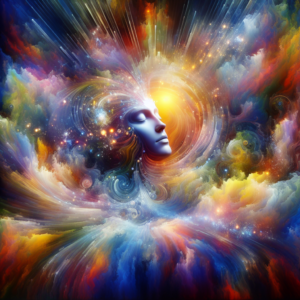Spiritual Devotional about Non-Duality and Oneness
Title: Embracing Oneness: A Journey into Non-Duality
Hello, dear friends in faith and seekers of truth!
Today, let’s embark on a journey into the profound and enlightening concept of Non-Duality, often referred to as Oneness. This idea transcends the dualistic nature of our everyday perceptions and guides us toward a deeper understanding of our spiritual essence. It’s a journey that promises not only personal growth but also a richer communion with the divine and all of creation.
Understanding Non-Duality
Non-Duality, at its core, is the belief that everything is interconnected, that we are all part of a singular, divine reality. It challenges the notion that we are separate individuals, encouraging us instead to see ourselves as integral parts of a greater whole. Imagine the universe as a vast ocean and each one of us as a wave rising from it. While each wave has its individual existence, ultimately, it is inseparable from the ocean.
Biblical Insights into Oneness
The Bible, too, carries profound insights into the idea of Oneness. One of the clearest indications comes from the Gospel of John. In John 17:21, Jesus prays, "that all of them may be one, Father, just as you are in me and I am in you. May they also be in us so that the world may believe that you have sent me." Here, Jesus speaks of a unity that transcends individual existence—a unity as profound as that which exists between Him and the Father. This prayer invites us to embrace our oneness with each other and with the divine.
Similarly, Paul the Apostle echoes this sentiment in Galatians 3:28: "There is neither Jew nor Gentile, neither slave nor free, nor is there male and female, for you are all one in Christ Jesus." These words remind us that our true identity is found not in our differences but in our unity as children of God.
Living in Oneness and Joy
Embracing the principle of Non-Duality invites us to live with heightened awareness and love. It calls us to dissolve the barriers of fear, judgment, and isolation, replacing them with compassion, understanding, and connection.
How, then, can we practically live out this Oneness? Here are a few ideas:
-
Reflect on Unity: Take time in prayer or meditation to reflect on how deeply interconnected you are with all of creation. Feel the divine connection that binds us all together.
-
Practice Compassion: Act with love and kindness towards others, recognizing that the light you see in them is the same light that shines within you.
-
Open Your Heart to All: Celebrate the diversity of experiences and backgrounds, knowing they enrich the fabric of our shared existence.
-
Seek Reconciliation: In moments of conflict or misunderstanding, strive for healing and unity, knowing that in Christ, all things are reconciled.
By embracing Non-Duality and Oneness, we align ourselves with a divine reality that is both beautiful and transformative. It fills our hearts with joy and our spirits with peace, reminding us that we are never alone, for we are eternally one with God and each other.
So today, let us step forward with the assurance of this profound truth and extend our love to all corners of the earth. May our lives reflect the divine unity that binds us and may this understanding bring lasting joy to our hearts.
With love and blessings in abundance,
[Your Name]
Explore and dig up answers yourself with our BGodInspired Bible Tools! Be careful – each interaction is like a new treasure hunt… you can get lost for hours
Q&A about Non-Duality and Oneness
Q: What is Non-Duality?
A: Non-duality is a philosophical and spiritual concept that suggests the essential oneness of all things. It posits that the perceived separation between self and other, subject and object, or individual and universe is an illusion. Instead, there is a single, undivided reality or consciousness that forms the essence of all that exists.
Q: How does Non-Duality relate to Oneness?
A: Non-duality and oneness are closely related, often used interchangeably in spiritual contexts. Oneness refers to the interconnectedness and unity of all things, suggesting that at the deepest level, there is no separation between individuals or between the self and the universe. Non-duality is the perspective or realization of this intrinsic oneness.
Q: What are the benefits of experiencing Non-Duality or Oneness?
A: Experiencing non-duality or oneness can bring about a profound sense of peace, harmony, and connection with all life. It can lead to a dissolution of fear and anxiety, a greater capacity for love and compassion, and a sense of interconnectedness that transcends personal issues or conflicts. This perspective can also foster mindfulness and presence in daily life.
Q: Are Non-Duality and Oneness concepts found in specific spiritual traditions?
A: Yes, these concepts are central to many spiritual and religious traditions, including Advaita Vedanta in Hindu philosophy, Zen Buddhism, Taoism, and certain mystical branches of Christianity and Sufism. Each tradition may have its interpretation and method for realizing or experiencing this fundamental unity.
Q: How can someone cultivate an awareness of Non-Duality or Oneness?
A: Cultivating an awareness of non-duality often involves practices such as meditation, self-inquiry, mindfulness, and deep contemplation. Techniques like observing the mind and questioning the nature of the self and reality can help dismantle the perception of separateness. Reading spiritual texts and engaging with teachers who emphasize non-dual teachings can also guide this exploration.
Q: What role does ego play in the realization of Non-Duality?
A: The ego is typically viewed as the aspect of ourselves that clings to separation and identity. It creates narratives about who we are and how we relate to the world, reinforcing dualistic perspectives. Realization of non-duality often involves transcending or seeing through the ego’s illusions, recognizing that the egoic self is not the ultimate reality, but rather an aspect of our consciousness that can be observed and understood.
Q: Is Non-Duality contrary to individuality?
A: Non-duality does not deny individuality but rather places it in a broader context. While the individual self is part of our experience, non-duality emphasizes that this self is not the ultimate reality. Instead, individuality is seen as a unique expression of the one consciousness. The realization of non-duality can enrich one’s individuality by liberating it from the confines of ego-based separateness.
Q: Can science and Non-Duality be reconciled?
A: The relationship between science and non-duality is a topic of ongoing exploration. Some assert that certain scientific findings, particularly in quantum physics, resonate with non-dual insights by challenging traditional notions of separation and independent existence. While science typically relies on empirical evidence and measurable phenomena, non-duality speaks to experiential realization and subjective insight. The dialogue between these fields continues to evolve.



